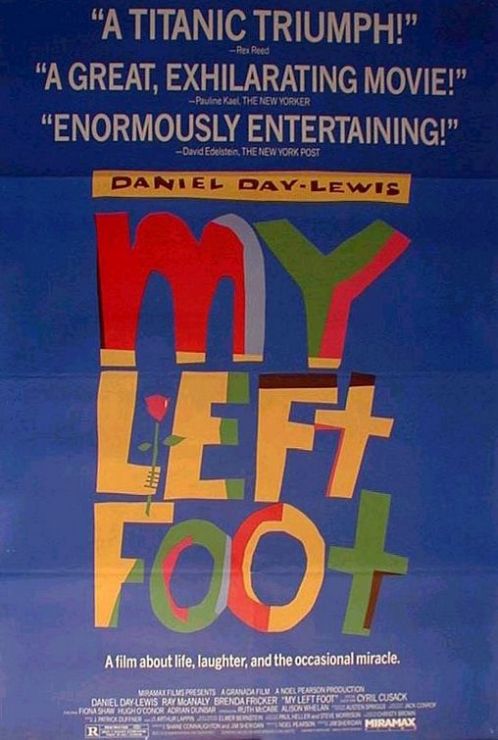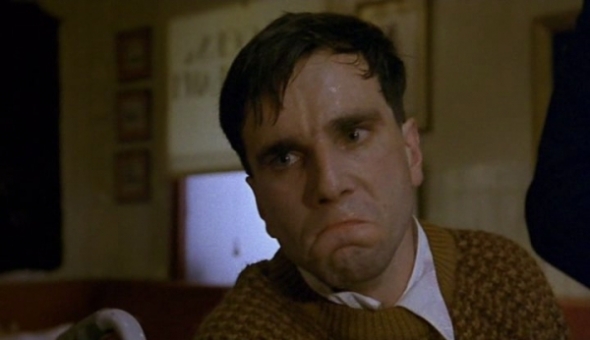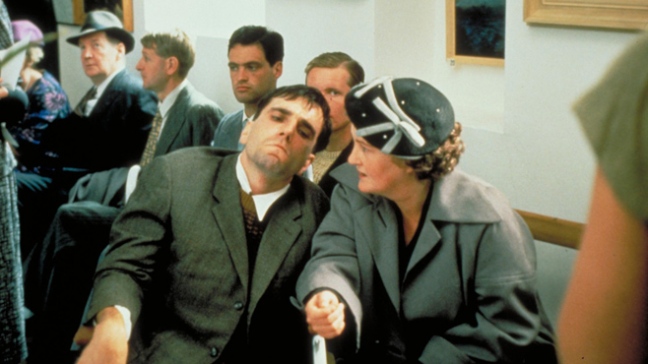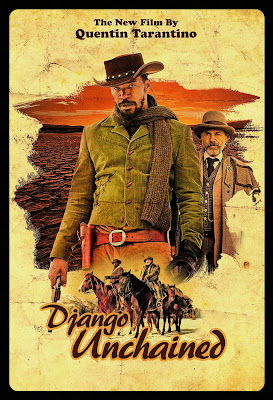As anybody who has read my Lincoln review will know, I am a big fan of Daniel Day-Lewis. That said, I did have to make a shameful confession in that review; that that film was actually the first I had seen this actor in. I have since set about making my way through his back catalogue, so far taking in Gangs of New York and There Will Be Blood. In each of these films, especially the latter, I have been blown away by the performances of Day-Lewis. When I became the grateful recipient of My Left Foot as a birthday gift, I wasted little time ripping it out of it’s cellophane wrapper and inserting it into the blu-ray player for an immediate watch. Needless to say, Day-Lewis makes it four out of four for performances I’ve been in awe of.
My Left Foot is the true story of Christy Brown (Day-Lewis), a boy born with severe cerebral palsy, a condition that resulted in him having only one controllable limb – his left leg – and for a long time rendered him unable to speak. However, Brown strives to overcome those barriers through his incredible paintings and his writing. The film displays the working class nature of Brown’s upbringing in Dublin, where he is one of a seemingly endless number of siblings. The film paints his father (Ray McAnally) as an always present, but somehow distant character. His mother (Brenda Flicker) is the opposite, devoting all of her time to raising her many children. The parents are very much divided into stereotypically working class roles; father as the bread-winner who likes a pint when he gets home, and mother as the hands on carer of the children.
The early years of Brown’s life are well handled. It displays the difficulties that he faced as a child, but it never lays it on too thick. We see the incredible way he moves, pulling himself around with his foot, as his family was unable to afford a wheelchair until he was much older. We see glimpses of the judgment he faced from others; there are scenes in which he is referred to by adults as ‘a moron’ and ‘a dunce’. There isn’t a lot of time spent on this, but it is enough to earn Brown the viewers sympathy. The actor who portrays Brown as a child, Hugh O’Connor, is worthy of a special mention; his performance is brilliant. Not once able to speak in anything other than guttural noises, he does a superb job of conveying all of Brown’s emotions through his face, and it’s very much in keeping with the performance that Day-Lewis later turns in.
It’s once the film moves into Brown’s later years that it really stats to excel. We see him fall in love with a Doctor who helps him learn to speak far more clearly than he was previously able to. The heartbreak of the unrequited love is a great vehicle in displaying how difficult Brown could be. He becomes rude and obnoxious, and we also get a glimpse at how much he enjoyed a drink. His alcohol dependency is something that is only very briefly explored and, if I’m honest, I’d have liked that area to have been better developed. That said, I write that without having read the book that the film is adapted from (that being the book of the same name, which was an autobiography by Brown himself). If that dependency isn’t addressed in the book, and the film wants to be faithful to it’s source material, then certainly that is a mitigating factor. From what I know of Brown’s story though, he had a high level of alcohol dependency and it feels a little like the screenplay, as written by Shane Connaughton and Jim Sheridan (who is also the director), has shied away from telling that part of the story to better propagate an inspirational tale.
That said, I did like that the film was more than happy to show us that Brown could be a difficult person to be around. As you would expect, he has some extremely down moments, all of which were well presented on screen. The real triumph in this film though is the performance of Day-Lewis. He is a notorious method actor and his way of getting into his role here is perhaps some of his most extreme. He was famously difficult, demanding that he be carried around by members of the film crew, refusing to walk so as not to break character. It pays off big time though; I said the same of his Lincoln portrayal, but his performance is of such quality that you never really feel like you’re watching an actor – it might as well be Brown himself on the screen. The quality with which Day-Lewis inhabits the character is truly extraordinary and he was well worthy of the Oscar that he won, this being the first of his three to date.
There are no real weak performances in this movie. Brown’s many immediate family members are all well portrayed, with each of them working well together to create the real feel of a daily working class struggle. Brenda Flicker is particularly good as Mrs. Brown, a woman clearly devoted to her family and desperate to provide the best life she can for Christy.
Despite showing a few signs of age (see a terrible looking bar fight for evidence), My Left Foot will continue to mostly stand the test of time due to the enduring nature of it’s story. In many ways, it is a typical triumph over adversity tale, but it’s a particularly good one. The fact that the story is real certainly adds to the interest and was something that was on my mind throughout. The performance by Day-Lewis lifts it to another level, but there is the occasional feeling that important details have been left to make the film as inspirational as it undoubtedly is. In picking and choosing the bits of Brown’s story that best suited this narrative, Jim Sheridan has done a good job in documenting a large part of a life less ordinary.
8/10




Leave a comment